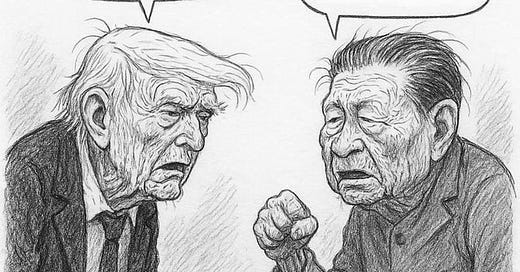Donald Trump says it's up to China now, urging them to reach a tariff agreement with the United States.
In the growing trade conflict, Donald Trump stated that China is also interested in what the U.S. possesses, specifically the "American consumer" or, in other words, American "money."
As the trade conflict between the US and China intensifies, President Donald Trump stated that it is now China's turn to negotiate a tariff agreement with him.
White House press secretary Karoline Leavitt shared a statement that she claimed Trump had dictated, saying, "The ball is in China's court. China must reach a deal with us. We are not obligated to make a deal with them."
Trump's statement continued, "There is no difference between China and any other nation, except that China is much bigger. They want what we have, which is what every country desires—the American consumer. In other words, they need our money."
This statement comes amid the ongoing struggle over tariffs between the two countries.
Recently, China instructed airlines to stop accepting deliveries of Boeing jets, which is a response to Trump's decision to increase tariffs on Chinese products to 145 percent.
On his Truth Social platform, Trump mentioned that China "backed out of the big Boeing deal, claiming they will 'not take possession' of the aircraft they had committed to."
At the same time, the Trump administration announced that it is in talks with many countries to negotiate trade deals that would ease the extensive tariffs imposed by the president.
Regarding the China-US trade war, last week, Trump declared a complete halt on all 'reciprocal' tariffs, except for those on China.
He mentioned that he approved a 90-day pause and significantly reduced the reciprocal tariff to 10 percent, effective immediately.
Additionally, he announced an increase in tariffs on Chinese goods, stating, "Due to the lack of respect China has shown to the world markets, I am raising the tariff charged to China by the United States to 125%, effective immediately.
Hopefully, soon, China will understand that taking advantage of the U.S.A. and other countries is no longer acceptable."
Two days later, the White House announced that the total tariff on China was now 145 percent. This figure included a 20 percent tax that was implemented earlier this year due to China's involvement in fentanyl trafficking.
The US president added a 125 percent tariff to help reduce America's trade deficit with China and to respond to China's retaliation against US import taxes.
In response, China has also imposed a 125 percent tariff on imports from the US.
On Wednesday, China reported that its economy grew by 5.4 percent in the first quarter, which was better than expected, as exporters hurried to ship their products before the new US tariffs took effect.
According to the National Bureau of Statistics (NBS) in Beijing, "preliminary estimates show that the gross domestic product in the first quarter... increased by 5.4 percent compared to the same time last year at constant prices."
The NBS also mentioned that "the foundation for ongoing economic recovery and growth is not yet solid," and emphasized the need for "more proactive and effective macro policies."




